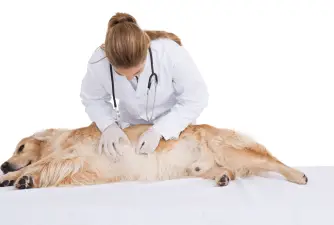Gastroenteritis in Dogs | Signs & Treatment
07.12.2021.
Our beloved dogs might seem tough, but they can have delicate digestion. Problems with the dog’s gastrointestinal tracts are pretty common. Whenever something disagrees with their digestive tract, the dog will get diarrhea or vomit. If you’re a dog owner, you know how common that is. However, there is one form of gastrointestinal issue that should not be taken lightly - gastroenteritis. If you noticed something weird going on with your dog’s digestion and you suspect this issue, here’s what you should know about gastroenteritis in dogs.
What is gastroenteritis in dogs?
The shortest and easiest way to describe gastroenteritis is - inflammation of the dog’s intestines, stomach, or both. Most of us get really worried about our dogs, but gastroenteritis is fairly common. However, there are different aspects of it, and some cases could be hard to treat.
How can I know my dog has gastroenteritis?
There are a few things that can point to gastroenteritis in dogs. Most of us will notice our dogs are somewhat under the weather. Most of us notice right away is diarrhea and vomiting, which are common signs of gastroenteritis. When these two things don’t stop, we take our dogs to the vet. The best way to learn our dog has this condition is to get a definite diagnosis from our vets. Another thing we can do is learn gastroenteritis symptoms.

Symptoms of gastroenteritis in dogs
One of the first things your vet will ask you when you bring your dog for an examination is what symptoms you noticed. Make sure you remember or write down everything you noticed that seemed off about your dog. That information will help vets quickly and more precisely determine the cause of symptoms. Here are the most common gastroenteritis symptoms in dogs;
- Gagging
- Diarrhea (can be explosive, bloody, and in large volume)
- Vomiting
- Foamy, yellowish bile in the vomit
- Lethargy
- Low fever
- Restlessness
- Abdominal pain
- Nausea
What causes it?
As we already said, a dog’s digestive tract is rather delicate. They might want to eat whatever they get their paws on, but that doesn’t mean they can handle it well. Gastroenteritis can be triggered by various different reasons, and you should be aware of them so you can prevent it from happening to your dog. Here are some possible causes of gastroenteritis in dogs;
- Cancer
- Foreign body
- Toxicity
- Ingestion of raw or spoiled foods
- Food sensitivities or allergies
- Obstructions
- Genetic predisposition
- Gastrointestinal ulcers
- Changes in intestinal flora
- Viruses (parvo, distemper, etc.)
- Intestinal parasites

VET TIP: You can help your vet by writing down all symptoms you noticed about your dog. Also, if your dog had some food indiscretions or ate something possibly you’re not sure is toxic, tell us! It will help us make an informed decision regarding treatment and diagnosis.
HGE in dogs
One of the most worrying signs for dogs, their owners, and vets is bloody gastroenteritis. This type of condition is called HGE, or hemorrhagic gastroenteritis. In recent times, it is called hemorrhagic diarrhea syndrome. It usually happens very quickly and can point to different life-threatening issues. You can read more about this type of gastroenteritis here - HGE in dogs.
How is gastroenteritis in dogs diagnosed?
After taking your dog to your vet, the vet will ask you about all the symptoms you noticed. The more information you tell your vet, the quicker they can go in the direction of gastroenteritis. In many cases, diagnosing gastroenteritis is an elimination game. The vet will check your dog for more severe conditions and rule them out. Gastroenteritis is a broad issue, and it can happen for various reasons. Here are some of the things that could help your vet make a diagnosis;
- Your dog’s current diet, feeding schedule, and amount
- Everything your dog ingested in the past 48 hours
- New things included in their diet (treats, foods, etc.)
- Meeting new animals or people
- Chronic diseases
- Medications, supplements, vitamins
- Diseases in the past month
- Previous cases of diarrhea, vomiting, and their causes
- Exposure to pesticides, cleaning solutions, or meds

After getting that information, the vet will decide what to do next. Some of the possible tests will include;
- Blood cell count - Traditional blood tests will show symptoms of dehydration or infections
- Urinalysis - Checking the dog’s urine will show signs of UTI, kidney issues, diabetes, or other issues that might cause gastroenteritis.
- X-rays - X-ray of the abdomen can show any obstructions or other abnormalities
- Ultrasound - Abdominal ultrasound can show obstructions and other abnormalities, similar to x-rays.
- Serum chemistries and electrolytes - This test can show the vet organ abnormalities or electrolyte imbalance caused by diarrhea and vomiting.
How is gastroenteritis in dogs treated?
One of the first things vets have to take care of is possible dehydration. Dogs that excessively vomit or have diarrhea will most likely get dehydrated and have a severe electrolyte imbalance. The vet might have to rehydrate and restore electrolytes. One of the things that dog owners think might help is Pedialyte, but that is not the best idea. The vet will most likely get an IV going. Other types of treatment will depend on the exact cause but might include;
- Antidiarrheal drugs - Antidiarrheal drugs will manage intestinal activity.
- Antibiotics - Antibiotics will control bacterial infections, and they will only be prescribed if that is the cause.
- Anti-emetic - These types of drugs are given to dogs for controlling vomiting.
- Gastrointestinal protectants - This drug will be given to dogs if they have gastrointestinal ulcers
In almost all cases of gastroenteritis in dogs, one treatment will be advised - withholding food. Dogs with gastroenteritis should not eat for 24 - 48 hours. After that period, food should be introduced slowly and in smaller amounts.
What is the prognosis?
The good news is that in most gastroenteritic cases, dogs’ health rapidly improves after rehydration. It is a relatively common medical issue dogs experience. The good news is that gastroenteritis in dogs is rarely life-threatening and that serious. However, you must start treatment and withhold your dog’s food.
World Dog Finder team







Share